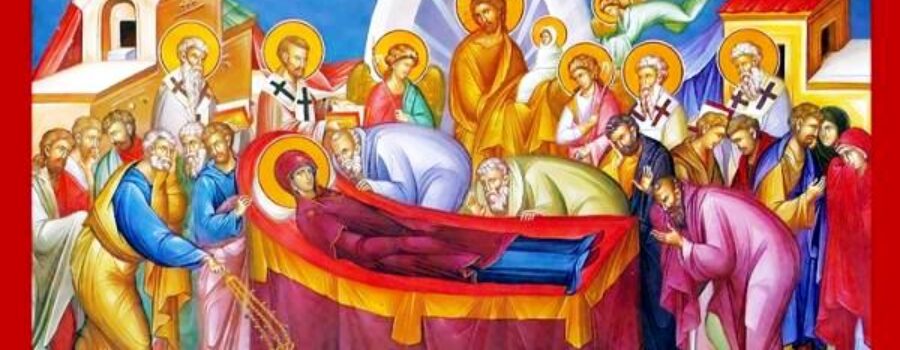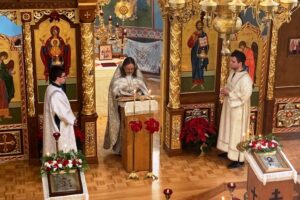The first two weeks of August are set aside as a special “protected” time of the year. As Great Lent prepares for the celebration of Easter and Pentecost and the Fast of Advent anticipates the feasts of Christmas and Theophany, this fast centers around the celebration of the feasts of the Transfiguration of Christ and the Dormition of the Theotokos.
The Dormition fast was established as preceding the great feasts of the Transfiguration of the Lord and of the Dormition of the Mother of God. It lasts two weeks—from August 1/14–August 14/27 (Old Style/ New Style). The Dormition fast comes down to us from the early days of Christianity. We find a clear reference to it in a conversation of Leo the Great from around the year 450 A.D. The Church fasts are situated in the year in such a way that a special abstinence is prescribed for each time. Thus, for spring there is the Forty Days of Great Lent; for summer there is the Apostles’ fast; for autumn there is the Dormition fast; and for winter there is the Nativity fast. St. Symeon of Thessalonica writes that, “The fast in August was established in honor of the Mother of God the Word, who, foreknowing her repose, ascetically labored and fasted for us as always, although she was holy and immaculate, and had no need for fasting. Thus, she especially prayed for us in preparation for being transported from this life to the future life, when her blessed soul would be united through the Divine Spirit with her Son. Therefore, we also should fast and praise her, emulating her life, urging her thereby to pray for us.” The Dormition fast is not as strict as the Great Fast, but it is stricter than the Apostle’s and Nativity fasts. During the two weeks, it is traditional, especially in Greek practice, to serve or read the Paraklesis daily (Supplicatory Canon to the Mother of God) daily.
The spiritual fast is closely united with the bodily, just as our soul is united with the body, penetrates it, enlivens it, and makes one united whole with it, as the soul and body make one living human being. Therefore, in fasting bodily we must at the same time fast spiritually: “Brothers, in fasting bodily let us also fast spiritually, severing all union with unrighteousness.”
Looking at these feasts, we see why the Church highlights this time as a special season of celebration. Christmas and Theophany proclaim the presence of Christ in the world, His historic coming in the flesh. Easter and Pentecost celebrate the fulfilled purpose of His coming: the presence of the Holy Spirit by the power of Christ’s resurrection. The feasts of Transfiguration and Dormition show us how this resurrection life will be realized for us in human flesh in the glorification of our bodies after the model of the transfigured Christ, a glorification already bestowed on the Theotokos because of her unique role in the salvation of humanity.
It is this physical glorification which we celebrate in the two Great Feasts of August. On the feast of the Transfiguration, we look on the glorified body of Christ, the model of our future risen bodies. On the feast of the Dormition, we celebrate Mary’s glorification and realize that already one of our race shares in that transfiguration which awaits us all in the Kingdom to come.
As with the Church’s other feast seasons, there are several special liturgical observances associated with this time of celebration:
Water Blessing – On the eve of August 1/14, the feast of the Procession of the Cross, a special service to the Theotokos is held to begin the season. Water is blessed, a frequent sign of transfiguration in Christ. As the cross comes in contact with the water, it is transformed into a sign of His presence. We drink this water in anticipation of our complete transformation, which we are celebrating in these days. In Constantinople, the feast was established as a means of sanctifying the city with the Precious Wood of the Cross by processing it through the streets to prevent diseases. It would be venerated in the altar table of the Great Church, Hagia Sophia. This date also commemorates the Baptism of Russia.
Transfiguration (August 6/19) The blessing of grapes, as well as other fruits and vegetables on this day, is a beautiful sign of the final transfiguration of all things in Christ. It signifies the ultimate flowering and fruitfulness of all creation in the paradise of God’s unending Kingdom of Life where all will be transformed by the glory of the Lord.
Dormition (August 15/28) Herbs and flowers are blessed on this day, recalling the tradition that a sweet fragrance filled the empty tomb of Mary when it was first opened.
Sources: st.xenia.org, stnicholasmarin.org




